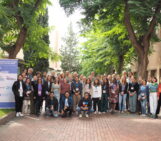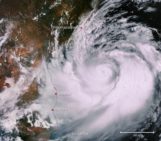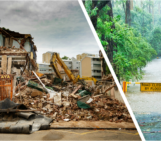
The Division on Natural Hazards of the European Geosciences Union is looking for a new Early Career Scientist (ECS) representative (rep) and co-representative (co-rep) for the period 2024-2026.
The outgoing rep (Silvia De Angeli) and co-rep (Negar Vakilifard) will be standing down officially at the EGU General Assembly 2024, so this is your opportunity to take these roles!
Why become an Early Career Scientist representative?
Being the ECS rep for an EGU division is a learning and enriching experience. As a main outcome, you will have more opportunities to interact with early career and senior scientists from all over the world, including those outside your scientific discipline. It will increase your opportunities for networking, and last but not least, it will enrich your CV, too.
Moreover, you will increase your interpersonal skills by actively supporting communication, coordination and promoting equality, diversity, and inclusion inside the ECS community.
Which are the activities that the NH Early Career Scientist rep should manage?
The main activities managed by the NH ECS rep encompass the coordination of the Natural hazards Early career scientists Team (NhET) by providing support to social media, Blog activities, and Campfires organisation, and arrange bi-monthly online meetings. The Team is currently composed of 60 members, and around 15 of them are actively involved.
Moreover, the NH ECS Rep meets with the other ECS reps from other divisions, and the overall union ECS reps once every few months to discuss how we can best support the interests of ECS members of the EGU community. This includes also making proposals to the Council to ensure that ECS views are heard at the highest levels within EGU. Once/Twice per year, ECS reps also gather in person in a European country to discuss the organisation of the upcoming General Assembly.
The Co-Rep should work jointly with the Rep to share the duties and backup in case the Rep cannot attend the whole ECS meetings (either in person or online).
For additional information about the ECS community
The EGU ECS website, where you can find out more about the goals of EGU’s ECS community can be found here.
You can find out more generally about being an ECS rep here.
How to apply
Interested candidates will be asked to apply by filling in a survey, providing information about their knowledge of EGU and NH division, previous experiences, ideas for future development of ECS activities, etc.
Please apply here! The deadline for applications is Friday 8 December at 18:00 CET.
Received candidatures will be shared among our Natural hazards Early Career Scientists Team (NhET), and the whole Team will be able to vote and express their preference. The full applications of the candidates will be shared with the voters, who will conduct their evaluation and vote democratically. The two people who will receive more votes will be selected as Rep and Co-rep, respectively.
Important disclaimer
Applications are open to everyone who is currently an Early Career Scientist! According to EGU official definition, “an Early Career Scientist (ECS) is a student, a PhD candidate, or a practising scientist who received their highest certificate (e.g. BSc, MSc or PhD) within the past seven years. The seven-year period can be extended to allow for periods when the scientist was not working in science because of, but not limited to, caring and/or parental responsibilities, disability, personal illness, community obligations or national service”.
Previous knowledge of the EGU NH Division, as well as involvement in their activities during the General Assembly and/or the rest of the year, will be considered as preferential factors in the evaluation but not as mandatory requirements.
If you are not successful, we’d still love to have you on our ECS Team, so please let us know on the form if you would be interested in participating.
If you have any questions or would like to know more, please contact us at ecs-nh@egu.eu.
Post edited by Asimina Voskaki and Negar Vakilifard




